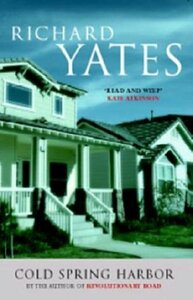Take a photo of a barcode or cover
Really disappointing. Yates’s idea of drifting between perspectives was interesting at first, but I found it lacking by the end - one of his greatest skills was in character studies and undertaking what made them tick. When he’s crammed so many perspectives into a novel so short, the result is fairly shallow and unrewarding. Most of the characters feel more like caricatures than rounded people.
Also holy hell this novel is weirdly horny. And incestuous. I could never quite work out whether he was playing for laughs or pathos here, but it comes across as neither and ends up being uncomfortable instead.
Also holy hell this novel is weirdly horny. And incestuous. I could never quite work out whether he was playing for laughs or pathos here, but it comes across as neither and ends up being uncomfortable instead.
Set in the mid-1930s, just before the war and during it, Cold Spring Harbor tells the story of two families — the Shephards and the Drakes — and their unlikely coming together.
The lynchpin of the story is Evan Shephard, a good-looking man with no direction and a deep love of automobiles, who meets young Rachel Drake by chance (his car breaks down, en route to New York, outside her childhood home) and later marries her. He already has one failed short-lived marriage behind him, and a young daughter, but his parents hope this will give their only son the fresh start he needs.
Later, when war breaks out, Evan is rejected because he has perforated eardrums, a decision that delights his wife (because it means he can stay at home) but disappoints his father (a former Army captain who had hoped a stint in the army might help his immature son grow up).
To save enough money to fund future university studies so Evan can become an engineer rather than a machinist, the couple move in with Rachel’s mother, the larger-than-life socially needy Mrs Drake, in a small house in Cold Spring Harbor, not far from where Evan grew up. Rachel’s younger brother still lives at home when he’s not at boarding school, so the house is relatively crowded (and damp).
Thrust together in this way, the tensions between everyone fester and stretch to breaking point. The novel is at its best focusing on these relationships, examining in almost forensic detail the ways in which they begin to unravel, but also honing in on the strained contact between the in-laws and the even more strained relationship between Evan and his father.
To read the rest of my review, please visit my blog.
The lynchpin of the story is Evan Shephard, a good-looking man with no direction and a deep love of automobiles, who meets young Rachel Drake by chance (his car breaks down, en route to New York, outside her childhood home) and later marries her. He already has one failed short-lived marriage behind him, and a young daughter, but his parents hope this will give their only son the fresh start he needs.
Later, when war breaks out, Evan is rejected because he has perforated eardrums, a decision that delights his wife (because it means he can stay at home) but disappoints his father (a former Army captain who had hoped a stint in the army might help his immature son grow up).
To save enough money to fund future university studies so Evan can become an engineer rather than a machinist, the couple move in with Rachel’s mother, the larger-than-life socially needy Mrs Drake, in a small house in Cold Spring Harbor, not far from where Evan grew up. Rachel’s younger brother still lives at home when he’s not at boarding school, so the house is relatively crowded (and damp).
Thrust together in this way, the tensions between everyone fester and stretch to breaking point. The novel is at its best focusing on these relationships, examining in almost forensic detail the ways in which they begin to unravel, but also honing in on the strained contact between the in-laws and the even more strained relationship between Evan and his father.
To read the rest of my review, please visit my blog.
Every time I read a book by Richard Yates these days, my heart breaks a little — not because the story or characters affected me in a particular way, but because I see what Yates was trying to do over and over again. With every subsequent book after Revolutionary Road, Yates tried to capture the same lightning in a bottle. While The Easter Parade was a good attempt, every other book that I have read of his just can't seem to measure up to the raw power of Revolutionary Road, his debut novel. Unfortunately, Cold Spring Harbor, to me, is one of Yates' lesser works.
Wow. Richard Yates pulls no punches. I am so happy to be making my way through his stuff. His books are exactly what I want in a novel.
Yates, you've done it again. Sophisticated and minimalistic.
I've been reading a lot of books these past few years, but rarely do I pick up a book where the author uses the English language as an art form. This is one of those books. Dedicated "For [a:Kurt Vonnegut|16861544|Kurt Vonnegut|https://s.gr-assets.com/assets/nophoto/user/u_50x66-632230dc9882b4352d753eedf9396530.png]" could we have expected anything less?
Everyone interacts with each other, but still feels the pangs of loneliness in this story as Yates paints a picture of people together and at odds in this book about a young couple's life in Cold Spring Harbor.
Everyone interacts with each other, but still feels the pangs of loneliness in this story as Yates paints a picture of people together and at odds in this book about a young couple's life in Cold Spring Harbor.
The Richard Yates' books that I have read have similar themes - marriage discontent, life in suburbia, drinking, life in the 1940's. Cold Spring Harbor followed that pattern. It is primarily the story of Evan, son of Charles and Grace Shepard. (Wasn't there a Shepard in one of his other novels, also?) Evan fixes cars, has a brief, young marriage and a daughter. Evan and his father have a chance meeting with the Drakes, which culminates in Evan's second marriage. Charles and Grace's marriage also adds to the story. Charles is a retired military man with fading eyesight, while Grace is an invalid/alcoholic.
Yates' writing and words take an ordinary story to another level.
"Dying for love might be pitiable, but it wasn't much different, finally, form any other kind of dying." (79)
Yates' writing and words take an ordinary story to another level.
"Dying for love might be pitiable, but it wasn't much different, finally, form any other kind of dying." (79)
Very well written, some beautiful interchanges between characters, but I was left feeling like 'so what'? What was the point?
“Dying for love might be pitiable, but it wasn’t much different, finally, from any other kind of dying.”
Cold Spring Harbor is a disappointing Yates novel. His final one, -- and by no coincidence I think -- Cold Spring Harbor is Yatesian in the sense that it covers loneliness, troubling family and relationship dynamics, and an inability for a young man to fit into the traditionally accepted social image projected from living a quintessentially American life. Its themes are familiar for Yates, but the story, clocking in at a lean 180 pages, is so basic that it's boring. It's interesting that Yates and so many writers of his ilk (e.g., Ford, Cheever, Updike, etc.) have made stories about "relatable dysfunctional American families and relationship dynamics" for decades and many of them are excellent. Revolutionary Road, for example, is one of my favorite novels. But the sense I get is that Yates, who wrote this novel in the mid-1980s, had exhausted himself of this sort of content and couldn't reinvent himself any other way. It's a shame on the one hand, but on the other the prose is also unexpectedly poor, and that is somehow even more unforgivable considering Yates' reputation as a brilliant writer. Characters are cliche-ridden and act in predictable and arbitrary ways. The reader often feels like they're reading a scene from a movie, not a scene from real life. To put it simply, there's no impetus for this story to exist. Certainly, there's no push or passion from Yates to compel. It's thematically vacuous and unsatisfying.
Cold Spring Harbor is a disappointing Yates novel. His final one, -- and by no coincidence I think -- Cold Spring Harbor is Yatesian in the sense that it covers loneliness, troubling family and relationship dynamics, and an inability for a young man to fit into the traditionally accepted social image projected from living a quintessentially American life. Its themes are familiar for Yates, but the story, clocking in at a lean 180 pages, is so basic that it's boring. It's interesting that Yates and so many writers of his ilk (e.g., Ford, Cheever, Updike, etc.) have made stories about "relatable dysfunctional American families and relationship dynamics" for decades and many of them are excellent. Revolutionary Road, for example, is one of my favorite novels. But the sense I get is that Yates, who wrote this novel in the mid-1980s, had exhausted himself of this sort of content and couldn't reinvent himself any other way. It's a shame on the one hand, but on the other the prose is also unexpectedly poor, and that is somehow even more unforgivable considering Yates' reputation as a brilliant writer. Characters are cliche-ridden and act in predictable and arbitrary ways. The reader often feels like they're reading a scene from a movie, not a scene from real life. To put it simply, there's no impetus for this story to exist. Certainly, there's no push or passion from Yates to compel. It's thematically vacuous and unsatisfying.
dark
sad
medium-paced
Plot or Character Driven:
Character
Strong character development:
No
Loveable characters:
No
Diverse cast of characters:
No
Flaws of characters a main focus:
Yes





